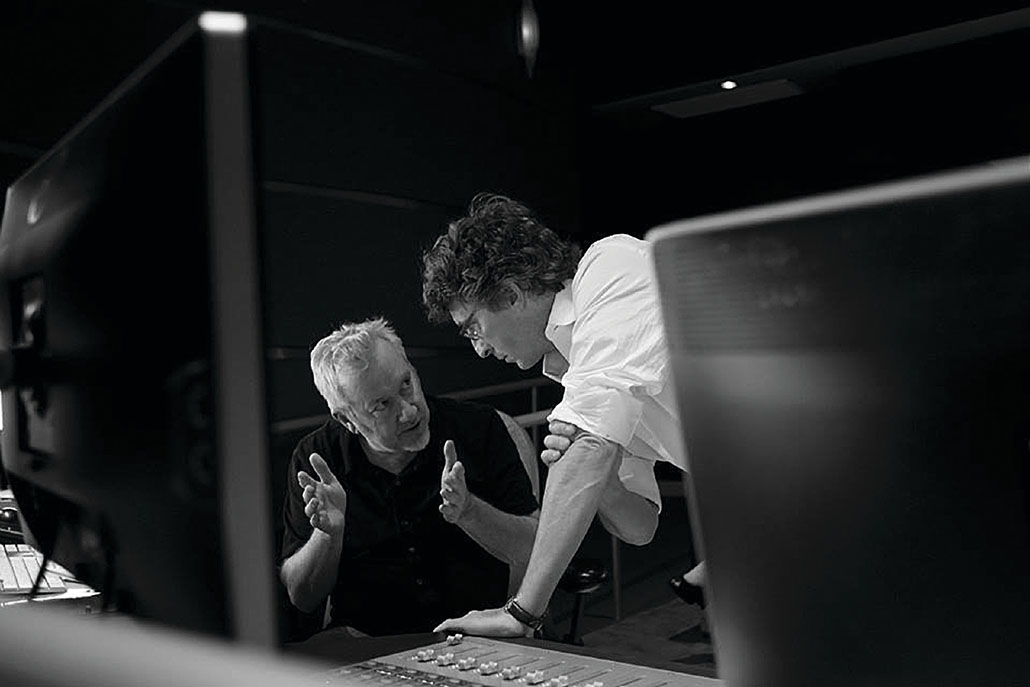by Richard Ford
As a music editor, I can honestly state that working with director Alexander Payne has to be one of the best gigs ever. He has a fantastic team, makes wonderful, moving films, and is nothing short of a pleasure to work with. I have been with him since 1999’s Election, followed by About Schmidt (2002) and Sideways (2004). Our last two films together — The Descendants (2011) and this year’s Nebraska — posed different and unexpected challenges from the previous films.
Typically, when I come onto a project, Alexander’s longtime picture editor, Kevin Tent, A.C.E., will have already placed a rough music outline into the film. I’ll watch the film to get a sense of the music the two of them have in the cut, and then discuss what they are looking for musically. In the past, while we would have had traditional spotting sessions together, more recently, on the last two projects, they’ve simply handed me the film so I can start playing with ideas.
On our films with a traditional score, composer Rolfe Kent — a longtime collaborator of Alexander’s — writes the music. So when I create a temp score, I’ll typically draw on cues from some of Rolfe’s previous work, supplemented by other scores, depending on the needs of the film. Then Rolfe will start sending mock-ups of his compositions, exchange ideas with Alexander and, when all is approved, the score is recorded, mixed and dubbed.
The Descendants
That had been our usual process. However, a few months before I started working on The Descendants, Alexander told me he wanted the score for that film to be made up solely of pre-existing, traditional Hawaiian music. I honestly didn’t think those were realistic expectations — a cohesive and emotional score comprised only of Hawaiian music that had already been recorded? It was an exciting challenge.
As Kevin explains, “We asked Richard to start very early in our editorial process. For a film like The Descendants, the music had to be incredibly delicate and subtle. So it was up to him and our music supervisor, Dondi Bastone, to start collecting and sifting through thousands of songs and artists — a massive undertaking, as we quickly learned.”

JA scene from The Descendants. Courtesy of Fox Searchlight Pictures
“‘Traditional Hawaiian music’ usually connotes lots of steel guitar and Don Ho vocals, but that’s hardly the case today,” Kevin continues. “Hawaiian music is much more than the clichéd sounds we so often associate with the Islands. There is a rich history of music in Hawaii, with influences as obscure as Mexican ranch hands from the 1800s. It is incredibly varied and has organically developed over the years into a unique genre.”
I started to work my way through a massive library of Hawaiian music that Dondi had assembled, with both older recordings from the 1930s, ‘40s and ‘50s, as well as a lot of traditional and contemporary slack-key guitar music. Ultimately, slack-key was the genre of music that felt best as underscore. That genre involves tuning down the strings (thus “slackened”) into specific open tunings. There are probably hundreds of these tunings; for generations, they were well-guarded family secrets.
Gaby Pahinui, considered the grandfather of Hawaiian slack-key guitar, features heavily in the film’s soundtrack. He was one of the first musicians to share his family’s tunings, which, in turn, began opening up the world of slack-key to a larger audience. In addition, the beautiful slack-key guitar work of Keola Beamer and Jeff Peterson provides the basis for the underscore.
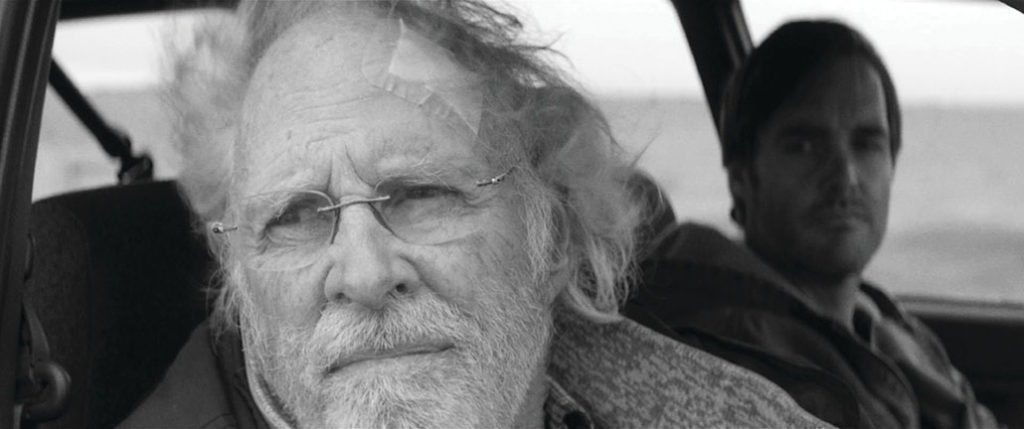
A scene from Nebraska.
Courtesy of Paramount Pictures
In the usual film scoring process, music is stemmed out with different instruments on each stem, providing both mixing and editing flexibility. However, on The Descendants, my options were limited, since I was working solely with stereo masters. Besides needing to find the right piece of music that might work in a scene, I often resorted to altering tempos or changing the pitch of pieces to help transitions. I also sweetened some tracks, by adding bass or ukulele. And on one solo guitar piece, I created a new flute (Hawaiian nose-flute, to be precise) melody that I adapted by editing the recording of a completely different song, by another artist, and overlaying it on the guitar piece.
I found I was also able to build thematic through-lines by drawing on traditional Hawaiian songs, since they often had been recorded by many artists over the years. If I found a melody that was working, I would scour my library, search online or head over to Amoeba Records in Hollywood to find versions by other artists that could also work in the context of the film. The whole process, while incredibly challenging, was immensely satisfying as it came together.
“It was truly a challenge for Richard to find and fit the right cue that could help us shift tones between the humor and the heartbreaking sadness of the film,” Kevin offers. “How to keep the songs buoyant, but not cartoony, to keep the music from turning the drama into melodrama? Very tricky stuff.”
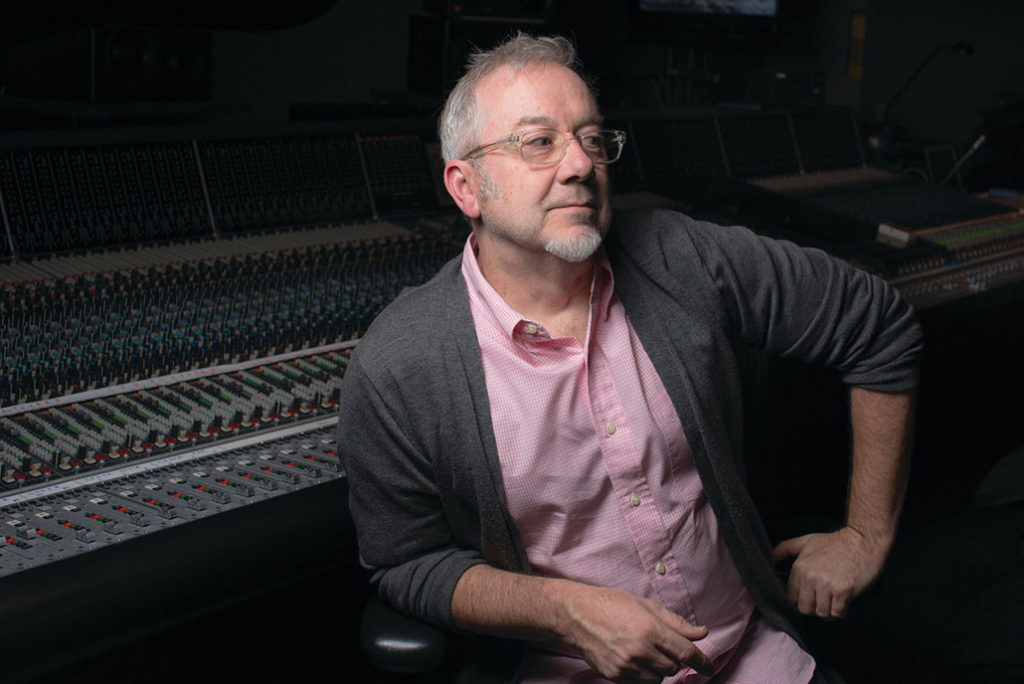
Richard Ford on the Sony scoring stage. Photo by Larry Mah
The Hawaiian score wove into the film beautifully. We were thrilled a few months later, to find out that the soundtrack CD received a Grammy nomination — a terrific honor for us, and a very nice salute to all the Hawaiian musicians involved.
Alexander very graciously wanted to credit me in the main titles, along with my Music Editor credit, in recognition of my work on the film, so he and Fox Searchlight, after some discussion, came up with Executive Music Producer. I was, and am, most appreciative, to say the least.
Nebraska
While the idea of scoring The Descendants with pre-existing Hawaiian music was Alexander’s original concept, Nebraska started with no defined musical direction. I think that was the first film where that happened for him. “Early on, Alexander was unclear what the music would be,” Kevin recalls. “He said to me more than once, ‘I can’t hear the music yet.’”
Once again, I was brought into the process early to start exploring ideas. I spent a couple of weeks, before the start of the director’s cut, trying different musical colors against an early assembled cut of the film. I tried a lot of acoustic music from the heartland. Not “country music,” per se, because that tends to lean in a specific direction, and one that I knew Alexander didn’t want. And bluegrass tended to brand the characters as “simple country folk” and, in the context of an Alexander Payne film — particularly this one — that didn’t feel right. I was looking for something that leaned toward the heartland of America but pulled from other musical genres as well.
I had been listening to the music of the group Tin Hat, for over 10 years. Originally from San Francisco, the band’s unique brand of acoustic chamber music has always felt filmic to me: strong melodies and themes, with thoughtful, sparse instrumentation. I cut a few of their pieces into the film, along with pieces from other artists, and it became apparent that the Tin Hat cues were sticking to the film well.

Richard Ford, left, and composer Mark Orton of Tin Hat.
Photo by Kimberly Warner
“Richard was onto something,” Kevin says. “They felt right. They had warmth and some were catchy. But unlike a traditional score, they held back on playing the emotion of the scenes.”
One of the film’s producers, Albert Berger, happened to know the members of Tin Hat, and set up a call for me with a couple of them, including composer Mark Orton. Mark had scored some indie films and documentaries, and sent me a nice selection of his music to play with. I found some lovely pieces, in particular a couple from an indie film he had scored called Sweet Land. Ultimately, these became the two main themes in Nebraska.
The temp began feeling stronger and more cohesive as I introduced more Orton compositions. We screened the film a couple of times with a temp score comprised of him, Tin Hat pieces and a handful of other artists.
When Alexander decided he was taking the film to the Cannes Film Festival, he wanted (at least for that festival) to have the temp score consisting solely of Mark Orton and Tin Hat’s music. We were short on time, so Alexander and I headed up to Mark’s studio in Portland, Oregon for a few days. We went through the film with Mark, fine-tuning pieces and addressing any cues that weren’t quite nailing it. We managed to include some semi-spontaneous recording sessions, adding guitar, accordion and even a small string ensemble.
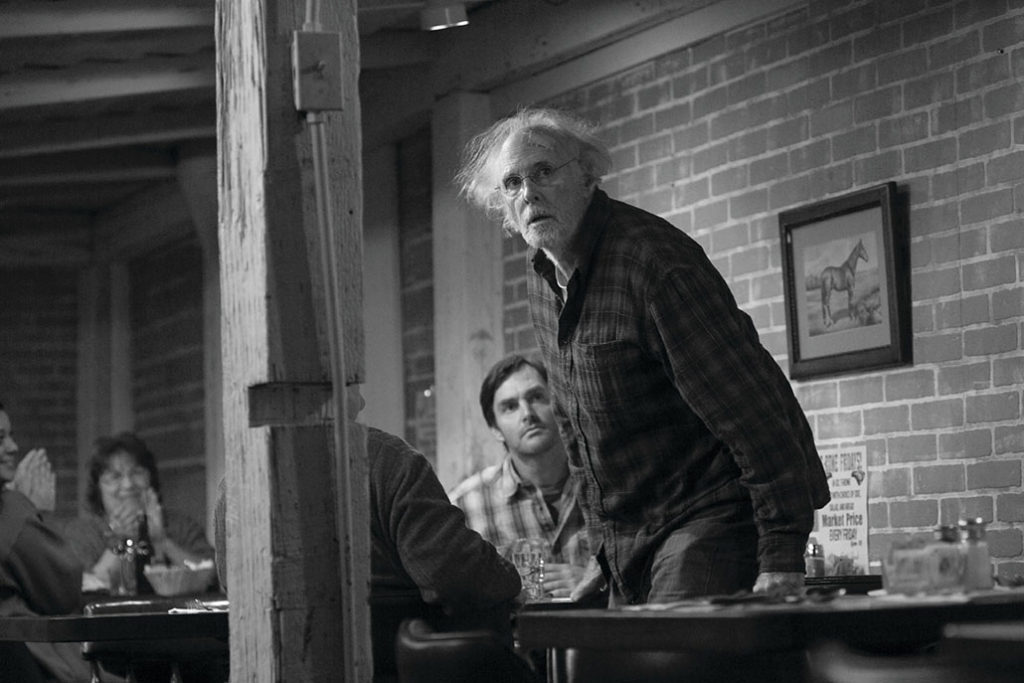
A scene from Nebraska.
Courtesy of Paramount Pictures
The film played really well in Cannes and, on his return to LA, Alexander made the decision to go with Mark’s music for the final film score. Up to this point, the intention was to replace the temp with originally scored material. As Kevin notes, “Alexander knew he had found the sound of the film.”
As well as being an outstanding composer and multi-instrumentalist, Mark is also an accomplished engineer, and was able to provide stems or original multi-tracks for all of his music, including some of the older Tin Hat Trio recordings. That gave me a lot more creative flexibility. I was able to move elements around and try things that normally wouldn’t be possible — an accordion line slowed down for a more delicate entry, or a piece deconstructed and slowed for the reprise of a theme. Luckily, he was very enthusiastic about my experimenting with his music, and supplied any new elements I needed. It was a really collaborative process.
Working toward the final score, we determined we would need an additional recording session in LA, so that Alexander, with his busy, end-of-post schedule, could be on hand. Mark had originally written a piece on piano for the scene where Bruce Dern’s character visits his decrepit childhood home, and sent a few versions, but it wasn’t feeling quite right.
We were looking for a particular quality of sound for the piece: a piano with just the right character. I looked around Los Angeles for an early 1900s Steinway that might have that sound. We found a few, plus a couple of old uprights, and managed to get them over to the Eastwood Scoring Stage at Warner Bros., with the help of contractor Peter Rotter. We ended up using a 1909 Steinway D, which sounded lovely, albeit very creaky and dusty — and the new cue worked beautifully. There is such a sense of relief when that one, last elusive cue finally finds its place in a movie!
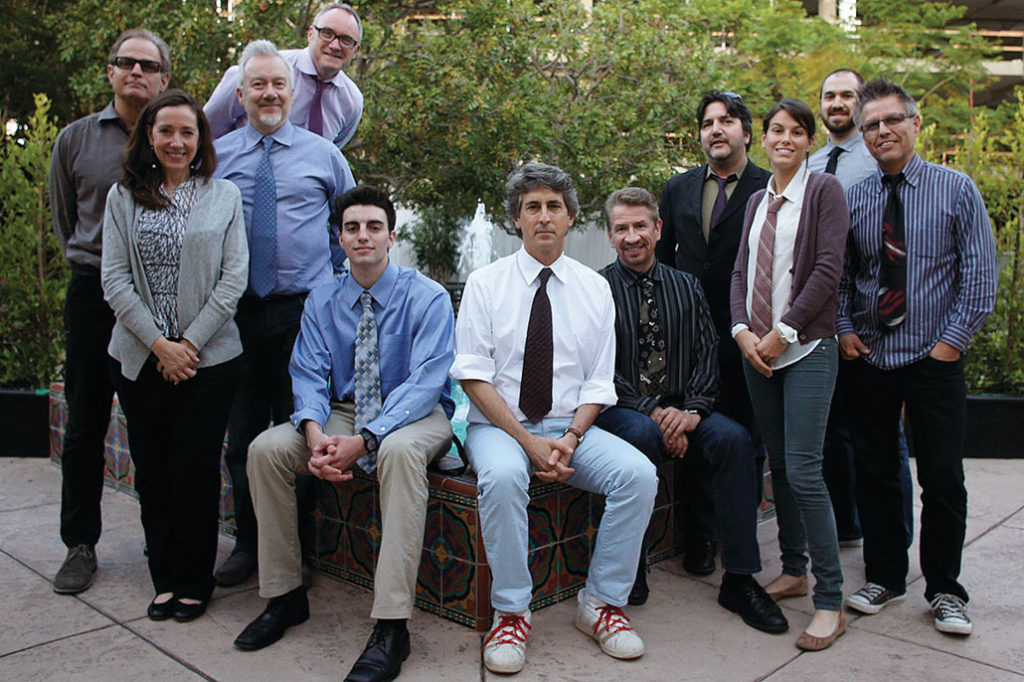
The Nebraska post-production crew: Rick Reynolds (post-production supervisor), left, Mindy Elliott (first assistant editor), Richard Ford (music editor/executive music producer), Kevin Tent (editor), Vincent Marinelli (intern), Alexander Payne (director), Patrick Cyccone (re-recording mixer), David Bach (dialogue editor), Anna Musso (assistant to the director), Jarred Marshack (engineer) and Frank Gaeta (sound supervisor).
Photo by Cole Cyccone
“It’s the perfect score for the film,” confirms Kevin. “It doesn’t comment on the drama or the comedy. It doesn’t force emotion or indicate to audiences how they’re supposed to feel. In a strange way, it almost plays independently from the film, and yet it feels so right in the world of the movie. Richard found the sound of the movie, and then nurtured that along until we had a complete, distinctive score.”
The film was mixed by Patrick Cyccone, a longtime alumnus who has mixed Alexander’s films since Election. Patrick has a wonderful feel for music and is a true collaborator. He did an outstanding job, along with our excellent sound supervisor, Frank Gaeta, who has also been part of the team for years.
Alexander constantly encourages those around him to be creative, something that results in getting the very best from his team. Kevin, the über-talented editor, is gracious and fantastic to work with. Mindy Elliot, Kevin’s first assistant, is also a major creative talent. She’s the person behind the curtain and runs a tight but very relaxed ship. And, most importantly, Alexander, one of the great directors, is a thoughtful, funny and generous man. It’s a wonderful environment to work in.
The opportunity to adapt a great temp score into a successful final score is a music editor’s fantasy. Again, on Nebraska, Alexander credited me as the film’s Executive Music Producer. I am truly grateful and extremely proud to have been part of this very special film — and part of his creative team.
The Soundtrack Album
Mark had asked me to produce the soundtrack CD, and I jumped at the opportunity; it had been a thrill to work with him on Nebraska. As there had been some musical repetition needed for thematic through-lines, and some cues were abridged to work in the context of the film, we decided to expand on some of the pieces for the CD, to make for a more listenable disc.
I did some re-arrangement sketches in Pro Tools, and went up to Mark’s studio for a few days to figure out what needed to be re-worked and how we would achieve it. A month later, I returned for the recording and mix sessions with Mark. This recording is the first time in years that the original Tin Hat Trio line-up has played together, and we captured some fantastic performances.
Mark and I are both extremely happy with the resulting “Nebraska” soundtrack CD (on Milan Records). It seems fitting that the album is also being released on vinyl, given the throwback nature of this black-and-white film.


